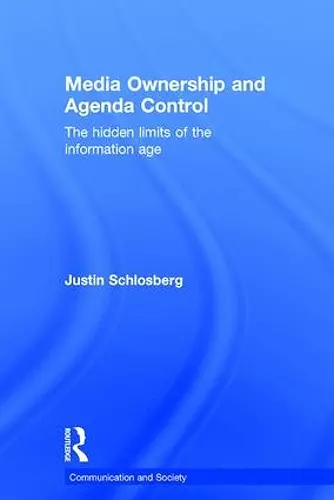Media Ownership and Agenda Control
The hidden limits of the information age
Format:Hardback
Publisher:Taylor & Francis Ltd
Published:29th Nov '16
Currently unavailable, and unfortunately no date known when it will be back
This hardback is available in another edition too:
- Paperback£38.99(9781138775466)

Media Ownership and Agenda Control offers a detailed examination of media ownership amidst the complexities of the information age, from the resurgence of press barons to the new influence wielded by internet giants. Much of the discussion pivots around recent revelations and controversies in the media industry, such as the findings published in 2012 from the Leveson Inquiry, the US Federal Communications Commission’s ruling on net neutrality in 2015, Edward Snowden’s decision to leak National Security Agency (NSA) documents in 2013 and the legal battles over ancillary copyrights waged in Germany and elsewhere. Justin Schlosberg traces the obscure and often unnoticed ways in which agendas continue to be shaped by a small number of individual and institutional megaphones, despite the rise of grassroots and participatory platforms, and despite ubiquitous displays of adversarial journalism. Above all, it explores the web of connections and interdependence that binds old and new media gatekeepers, and cements them to the surveillance and warfare state. This ultimately foregrounds the book’s call for a radical rethink of ownership regulation, situating the movement for progressive media reform alongside wider struggles against the iniquities and injustices of global capitalism.
This book’s re-evaluation of the nature of media ownership and control in a postdigital world will prove to be an invaluable resource for students of media studies and journalism, as well as all those with an interest in the changing dynamics of media power.
Get involved: Reclaimthemedia.org
It’s a good and topical idea. Media ownership is an ongoing issue of concern relating to economics (monopoly) but also to socio-cultural ideals (pluralism, diversity, freedom of expression)... I believe that the proposal would be strengthened if the author dealt a bit more with mergers and acquisitions in the new digital era involving social media firms. This would make the work even more topical and would certainly add value. - Professor Petros Iosifidis, London City University, UK
The topics covered in this book are clearly important, timely, intriguing, challenging, complex, and fundamental... but without detailed chapter outlines, it’s just hard to assess what the actual content, presentation, and level will be... If much of the principles and issues are grounded in the UK situation, then it may be of interest to individual researchers and scholars, but will not be adopted as a book in courses in other countries. - Professor Ronald E. Rice, UC Santa Barbara, USA
The proposal outlines highly appropriate areas concerning media ownership. Issues of pluralism, policy regulation and digitalisation offer a comprehensive approach to the subject. The argumentation is clear and the outline of topics is relevant...The proposal mentions empirical analyses, the use of examples and international comparisons, without specifying what these might be. The proposal seems rather UK-centric in orientation. - Helle Sjøvaag,University of Bergen, Norway
After seeing how the book was being framed, and how it is positioned relative to other available books, I became convinced that the idea of the book is indeed a good one...I would argue that the other important angle that needs to be addressed (presumably in this section, but possibly elsewhere instead/as well) is the role that these intermediaries play in the dynamics of media consumption...I was very impressed with how thorough the book’s plan is, in terms of topics needing to be covered. - Professor Philip M. Napoli, Fordham University, USA
Professor Greg Philo, Glasgow Media Group: "a really excellent account of how agenda control in the information age is secured through alliances between political, economic and media elites. It is essential reading for contemporary social science and media studies - and especially for students and teachers interested in how communications relate to political and economic power"
Paul Mason, author and journalist: "In an analytical tour de force, Schlosberg weaves through the complexities of media political economy in the 21st century, illuminating the often unseen ways in which both old and new forms of media power are coalescing and deeply impacting on the mainstream agenda. A must read for anyone with a concern for the media’s enduring potential to distort public debate and subvert democracy, as well as how things could be different."
Professor Natalie Fenton, Goldsmiths College: "This is a vitally important book for anyone interested in the relationship between media, power and democracy. With deftness and critical diligence, Schlosberg redefines debates over media ownership and control for the digital age. He reveals that far from power waning in a world of media abundance, the agenda influencing power of major media brands is in fact evolving. And then he tells us what we can do about it. Brilliant."
Ken Loach: 'Justin Schlosberg asks a question central to our democracy: who writes the news? Who do they represent? What are the ideas and interests they defend? This book will be an invaluable contribution to understanding who controls the flow and interpretation of news and, further, how we should establish a press that is genuinely free.’
ISBN: 9781138775459
Dimensions: unknown
Weight: 510g
190 pages